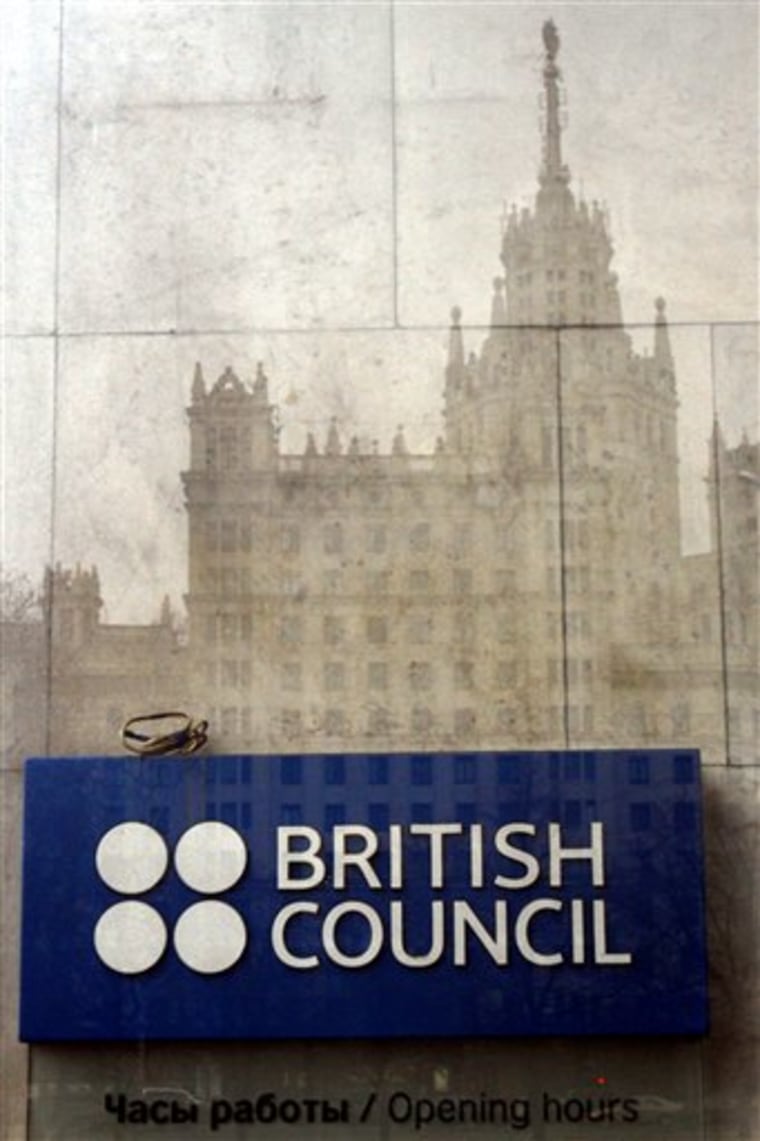Britain's foreign secretary on Thursday accused Russian authorities of "blatant intimidation" of staff at a British cultural body caught up in a diplomatic feud between Moscow and London, saying Russia's behavior evoked memories of the Cold War.
The British Council said it was suspending operations in the cities of St. Petersburg and Yekaterinburg, where its offices had been ordered to close by Russian officials.
Foreign Secretary David Miliband said Britain felt "anger and dismay" at Russia's actions.
"We saw similar actions during the Cold War, but frankly thought they had been put behind us," Miliband told lawmakers in the House of Commons.
He said Russia's actions "are reprehensible, not worthy of a great country, and contrary to the letter and spirit of the legal framework under which the British Council operates."
The confrontation over the council — an international cultural body funded by the British government — has poisoned relations between the two countries, already badly strained over the killing in London in 2006 of former Russian security agent Alexander Litvinenko.
Russia accuses the British Council of operating illegally, a claim Britain denies.
Staffers asked about pets
The director of the council's St. Petersburg office, Stephen Kinnock, was stopped for a traffic violation Tuesday night in what Britain said was a politically motivated episode, and the council's Russian staff were interviewed by police and agents of Russia's intelligence service, the FSB.
Miliband said 10 of the staff were interviewed at home late at night. "Questioning ranged from the institutional status of the British Council to personal questions about the health and welfare of family pets," he said.
"These Russian citizens ... have been the subject of blatant intimidation from their own government," he said.
The FSB, or Federal Security Service, said it had conducted "explanatory work" with the employees with the aim of "protecting Russian citizens from possibly being drawn into the Britons' provocative games as tools."
In St. Petersburg, British Council spokesman Stanislav Smirnov said the authorities had been polite and had not threatened staff.
"However, you can imagine how normal people feel when police comes to visit them at home at midnight," he said.
In London, British Council chief executive Martin Davidson said the interviews had placed "undue pressure on innocent individuals."
'Impossible to operate'
"The Russian authorities have made it impossible to operate in St. Petersburg and Yekaterinburg and I have therefore decided to suspend operations in both cities," he said.
Davidson said the council, which operates in more than 100 countries and employs about 100 people in Russia, would continue to work from its Moscow office.
The long-simmering dispute flared this week after the organization defied Russian orders to shut its offices in St. Petersburg and the Ural Mountains city of Yekaterinburg.
Russian authorities summoned the British ambassador in Moscow earlier this week to complain that the reopening of the two council offices after the New Year holiday was "a deliberate provocation."
Litvinenko's death in London from radiation poisoning has deepened tension between the West and Russia under President Vladimir Putin, a longtime KGB officer and former FSB chief who has been increasingly assertive toward Europe and the United States.
The United States and the European Union took Britain's side in the dispute. In Washington, the State Department said it "regrets" the actions taken by Russia.
The European Union chided Russia for "the harassment of British Council staff" and urged Moscow to let the British Council "operate freely and effectively in Russia and to take no further actions that might hinder its activities."
Litvinenko's slaying led to tit-for-tat expulsions of diplomats from London and Moscow when Russia refused to extradite Andrei Lugovoi, the man British prosecutors consider the main suspect in the killing.
Miliband said Britain would not retaliate against Russian cultural activities or representatives in Britain, saying culture should not become "a political football."
He said the incident raised "serious questions about (Russia's) observance of international law as well as about the standards of behavior she is prepared to adopt toward her own citizens."
